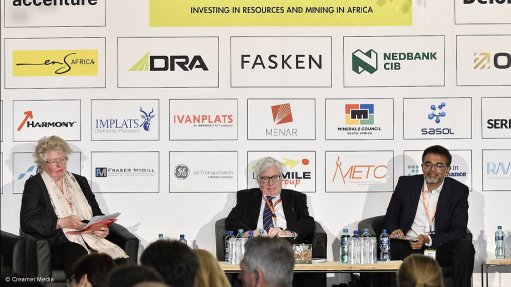
Fiona Perrot-Humphrey, Sandy McGregor and Myuran Rajaratnam
Photo by: Creamer Media's Dylan Slater
JOHANNESBURG (miningweekly.com) – Asset managers globally have become the lightning rod of populist views in Western countries, with the conversation now dominated by climate-change issues within the environmental, social and governance (ESG) paradigm as well as what the prospective upheaval in the vehicle industry means for different metals, the Joburg Indaba heard this week.
Investor respect for ESG is in a rapid state of evolution, was the message delivered by a panel chaired by Rothschild senior mining team adviser Fiona Perrott-Humphrey and including Blackrock’s Evy Hambro, Investec Asset Management portfolio manager George Cheveley, Allan Gray portfolio manager Sandy McGregor and Metal Industries Benefit Funds Administrators portfolio manager Myuran Rajaratnam. (Also watch attached Creamer Media video.)
ESG, which refers to the three central factors in measuring the sustainability and ethical impact of an investment, is being used to determine the value of companies.
“ESG is having an impact on the way we are allocating our funds, firstly from the increased relevance of this, but also thinking about how these factors will impact commodity prices and therefore value we see in the market,” Hambro said during a panel discussion covered by Mining Weekly Online.
Perrott-Humphrey asked Cheveley to outline how he goes about developing ESG-compliant portfolios when they might involve metals that have a green usage at the end of their lives but perhaps socially unacceptable and environmentally unfriendly aspects at mining and processing stages.
Cheveley responded by talking about his company’s Global Environment Fund, which incorporated ESG in its view of companies, but was an impact fund pursuing decarbonisation and trying to take advantage of the growing need for investment in climate-positive opportunities.
Perrott-Humphrey questioned Rajaratnam on where the ESG box-ticking by global passive investors left investment in South Africa mining stocks.
Rajaratnam responded that, while there were still good returns to be made in South Africa, which has had an 8% real return over 100 years, the country ultimately always did the right thing, but only after first trying out all the alternatives.
Strong South African investment positives were that the rule of law was obeyed, commodity stocks provided portfolio balance against inflation and the limited capital inflow kept capital returns quite high.
Perrott-Humphrey asked McGregor to expand on the social aspect of ESG and the social implications to coal-mining countries of coal being denounced as being climate-negative. McGregor cautioned about the implications of emerging economies being forced to opt for a carbon-free future and then being faced with high social consequences.
Hambro countered that being forced to breathe in terrible air and drink low quality water was a much greater cost to society than investing in renewables represented.
Cheveley said the cost of producing renewable energy had fallen very rapidly and in some countries companies were moving ahead of governments when it came to deciding on investing in solar and wind energy.
“It is very important for companies and governments to work together and to stay with existing systems just because it is hard to change is not the right answer. We have to change but we do have to work with companies and governments to work out how to make the transition so that people don't get left behind,” said Cheveley.